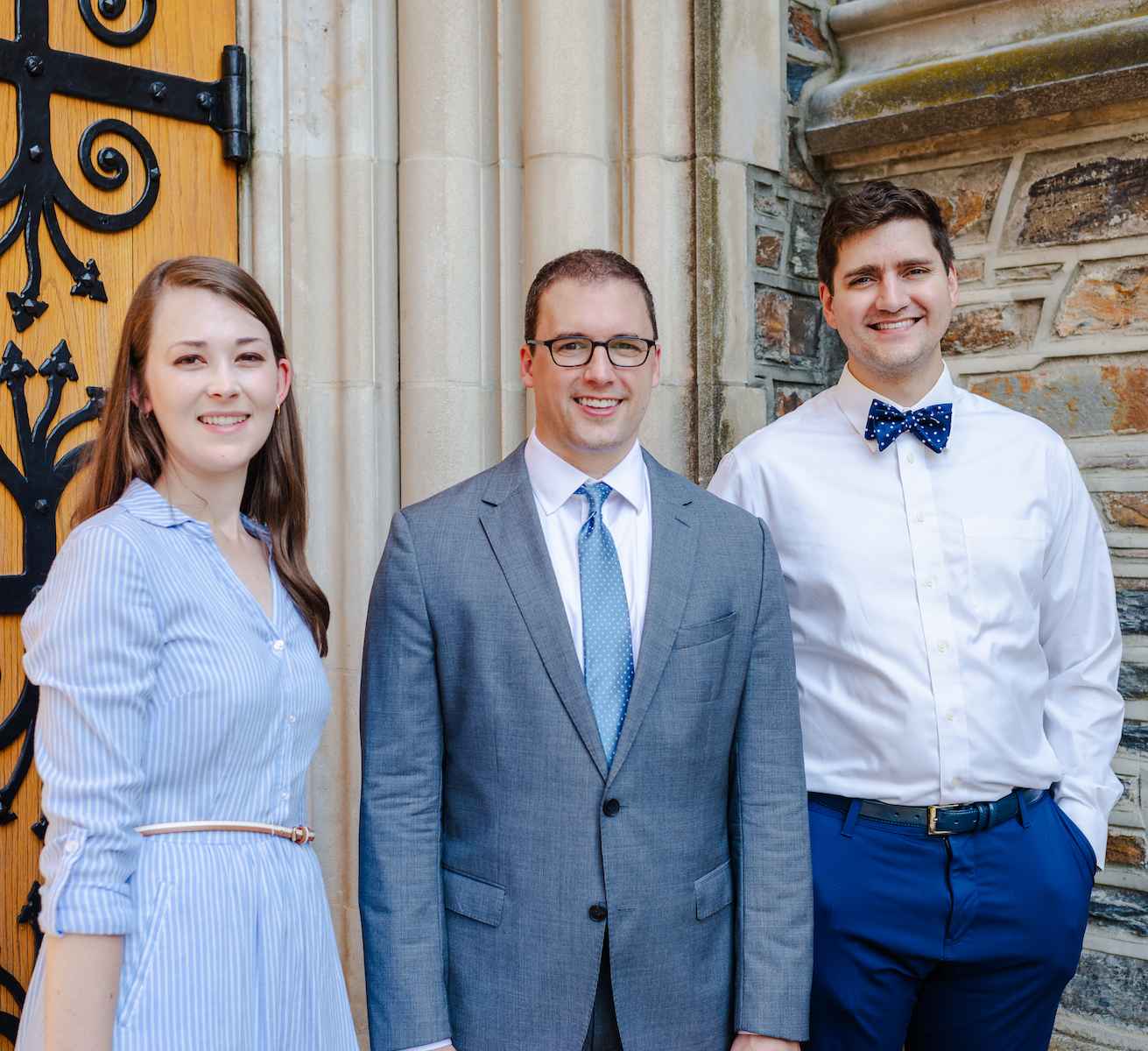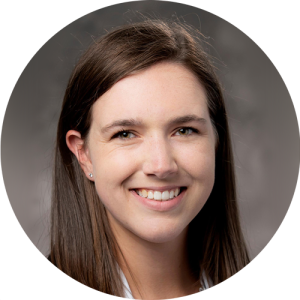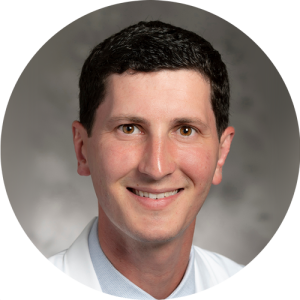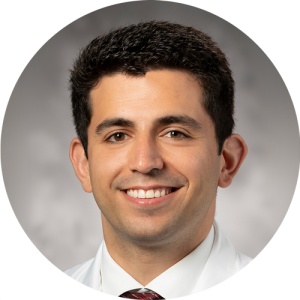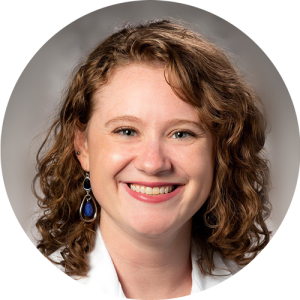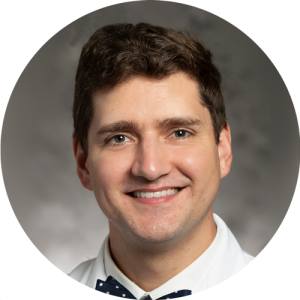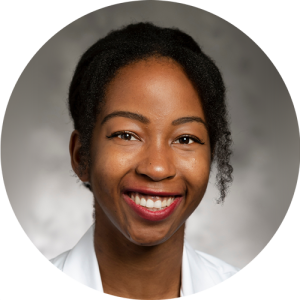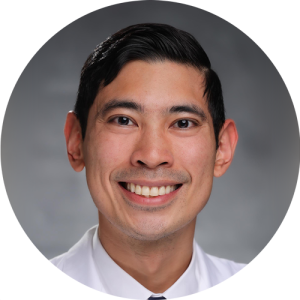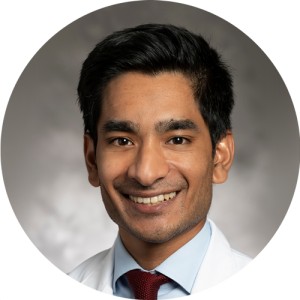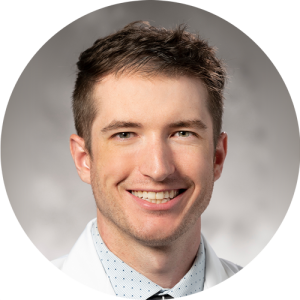Education
As the next generation of physicians traverses our halls, they bear witness to the transformative impacts on surgical medicine and glean insights from some of the foremost experts in the field. In this section, you’ll discover that these emerging leaders are not merely learners; they are active contributors, earning accolades and securing funding from prestigious institutions and organizations. These achievements not only recognize their individual prowess but also serve as catalysts, propelling our collective journey towards accelerated medical advances.
–John Migaly, MD
Vice Chair of Education

The 149 residents and fellows that train within the Duke Department of Surgery represent tomorrow’s leaders in surgical excellence.
In the 2022-2023 academic year, Duke Surgery housed 126 residents in seven programs spanning five surgical disciplines.
The 25 residents participating in their dedicated research years were focused on using data to discover novel surgical techniques, improve health system operations and surgical education, solve unanswered immunologic questions, and better patient outcomes.
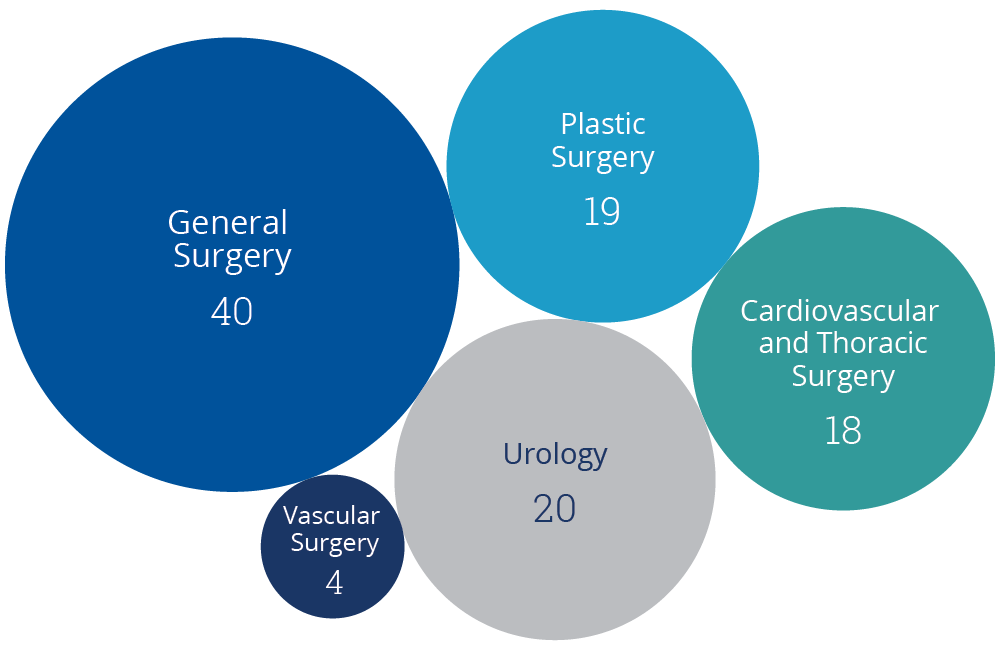
From right here in North Carolina to the Midwest to the Middle East, Duke Surgery attracts the brightest medical minds.
Interns' Medical School Locations
The residents of the 2022-2023 intern class hail from medical schools across 10 U.S. states and five countries.
Interns' Medical School Locations
The residents of the 2022-2023 intern class hail from medical schools across 10 U.S. states and five countries.
From right here in North Carolina to the Midwest to the Middle East, Duke Surgery attracts the brightest medical minds.
Resident Diversity Report
“Diversity with regards to race, ethnicity, gender, socioeconomic status, gender identity, immigrant status, and sexual orientation fuels our growth and agility as a training program and enhances the care we provide to the patients we serve.”
–John Migaly, MD
Vice Chair of Education
From the Vice Chair’s Pledge on Diversity
While there is still ample work to be done, Duke’s surgical residency programs have focused recruitment activities on more equitable efforts, such as introducing more opportunities for underrepresented in medicine (URiM) students to connect with faculty and residents, virtual information sessions and open houses, and enhancing participation in affinity societies and associations.
In a new education initiative that launched in 2023, Duke Surgery faculty and residents are exploring what matters most to trainees, and are establishing a new curriculum that seeks to redefine what it means to be a ‘good’ surgeon.
Ryan Antiel, MD, MS, Assistant Professor of Surgery, and Thomas “Clark” Howell, MD, General Surgery resident, began the Project on the Good Surgeon as a means of helping surgical residents maintain their mental health, their empathy and compassion toward patients, and their sense of purpose.
Read the full feature story on the Surgery website.
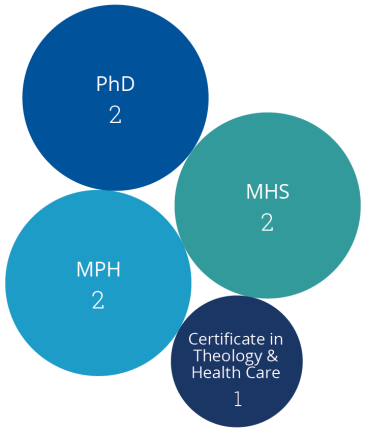
Trainees are supported in their goals of continuing their education and preparing to enter specialized fields of research and clinical care.
During the 2022-2023 academic year, two Duke Surgery trainees were pursuing a PhD, two Masters of Health Sciences (MHS), two Masters in Public Health (MPH), and one Certificate in Theology and Healthcare.
From Trainees to Faculty
Thirteen residents and fellows who graduated from Duke Surgery programs within the last five years now hold faculty positions in the department, reflecting a meaningful commitment to the Duke Surgery mission, and an investment by the department back into its people.
For many residency applicants, the city where they will train is just as important as how the residency program will help shape their medical journey.
Not only will this new location jumpstart their surgical careers, but the city will be their new home for the next several years where they can relax and have an enriching life outside of their work.
Hear from three Duke Surgery residents as they share their favorite eats, meets, and greets around Durham and the Triangle.
Read the full feature story on the Surgery website.
Trainee Accomplishments
Whether in the lab, the operating room, a conference presentation, or a clinic abroad, Duke Surgery trainees are recognized for their passion and commitment to their education in becoming well-rounded, skilled surgeon–scientists.
Here are just some of the impressive achievements made by our trainees this year.
The Golden Apple Awards are the highest teaching awards presented annually by medical students from the Duke University School of Medicine.
Kristen Rodin, MD
PGY-3, General Surgery
Recipients of the MS4 Teaching Scholarship have a leadership role opportunity as the STAR Course Director to help design and run a medical-school-level course, which creates a learning experience for medical students who are matched into surgical specialties.
Alex Bartholomew, MD
Research Resident
The Sabiston Teaching Scholars Program develops educational leaders in surgery who support the Surgery clerkship by teaching labs, providing lectures, serving as mentors, and contributing to curriculum development.
Berk Aykut, MD
Research Resident
Shannon Barter, MD
Research Resident
Alex Bartholomew, MD
Research Resident
Thomas Howell, MD
Research Resident
Elishamu Kanu, MD
Research Resident
Roberto Loanzon, MD
Research Resident
Sabran Masoud, MD
Research Resident
Anthony Saxton, MD
Research Resident
The Surgical Education Research Fellowship (SERF) is a national, one year, home-site fellowship designed to equip investigators with the skills and knowledge needed to plan, implement, and report studies in the field of surgical education.
Shannon Barter, MD
Research Resident
Growing Programs and Initiatives

Surgery Education Research Group (SERG) Surges Forward
Duke SERG offers residents and Duke medical students a unique opportunity to design and lead research projects aimed at enhancing surgical knowledge, technical skills, and more. The group presented 15 abstracts for poster or oral presentations at the 2023 Surgical Education Week.

New Robotics Certificate Established
Advances in technology continue to improve surgical care, and, with the increased utilization and importance of robotics to treat even the most complicated procedure, a Robotic Surgery Equivalency Certification was established for the residency programs. Thanks to this new opportunity, all 2023 chief residents graduated with the certificate.

SEAL Enriches Surgical Training
Co-directors Louise Jackson, MBBS, Assistant Professor of Surgery, and Sabino Zani, MD, Associate Professor of Surgery, have prioritized expanding SEAL to further enrich trainees' educational experiences. Among other initiatives, new specialized melanoma, anorectal, hepatopancreatobiliary, vascular ultrasound, and airway labs offer more immersive surgical simulation, and office hours are now available for personalized support for technical areas of focus.

Didactics Curriculum Evolves
The larger didactic curriculum, which covers topics from critical care to transplant surgery to a range of tactics residents are expected to know, has evolved to include lectures about ethics and professional development. At its implementation, retired Duke men’s basketball coach, Mike "Coach K" Krzyzewski, delivered an inspiring talk to surgery residents on remembering the ‘why’ of what surgeons do.

First Congenital Cardiac Surgery Fellow Graduates
The Duke Congenital Cardiac Surgery Fellowship is currently one of only a handful of its kind in the country, and one of only two in the southeast. Douglas Overbey, MD, was the first graduate of the program in 2023, and is now an Assistant Professor of Surgery in the Division of Cardiovascular and Thoracic Surgery.

First Surgical Education in Simulation Fellow Named
Funded by the Mario Family Foundation, the Surgical Education and Simulation Fellowship provides surgery residents with the expertise, competencies, and research skills required for graduate and undergraduate medical education leadership roles. General Surgery resident Shannon Barter, MD, is the first-ever fellow selected.

Video Coaching Initiative Introduced
This year, the Duke General Surgery Residency program launched a novel Video-Based Coaching curriculum, which features weekly sessions for junior- and senior-level review of intraoperative video in a group setting. Juniors have the opportunity to learn from faculty video on fundamental skills and introductory cases, while seniors learn from their own video with faculty feedback and expertise.
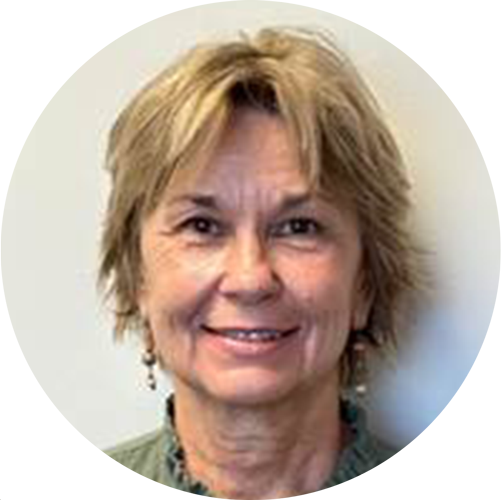
Tammy Watson
Program Coordinator, General Surgery Residency
Integrating New Residents Annually
Each year, as a new class of residents descends on Durham, Tammy Watson, Program Coordinator, assumes a pivotal role in ensuring their seamless integration into the General Surgery Residency Program. Tammy has been with Duke for more than thirty years, and sixteen of those years have been dedicated to the General Surgery Residency. She freely shares her wealth of experience with residents and colleagues, making her a prominent contributor to the educational mission. We are so grateful to have Tammy supporting our residents and are continuously honored to benefit from her superlative contributions.
Continuing Medical Education (CME) Events Draw Robust Participation
With the addition of new program coordinators, the Duke Surgery education team hosted 39 CME-related events in FY ’23, which also saw the successful return to in-person community events.
These included four CME conferences that focused on advancements and innovation in thoracic, transplant, and vascular specialties and drew international participation.
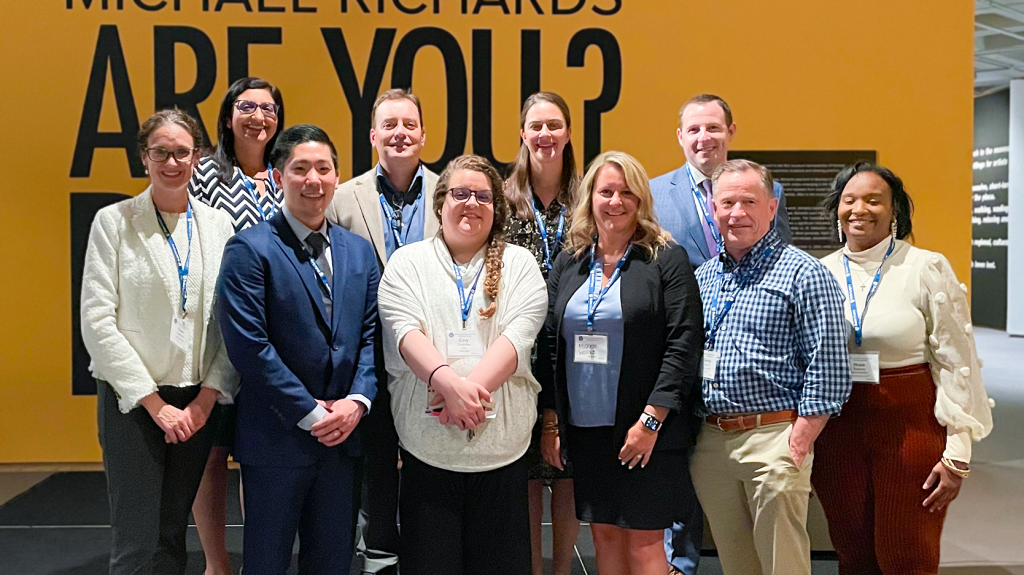
Give to Duke Surgery’s Education Fund
Gifts to the Duke Surgery Resident and Fellow Education Fund support education and research experiences for our trainees.
Be a part of the Duke Surgery mission.

